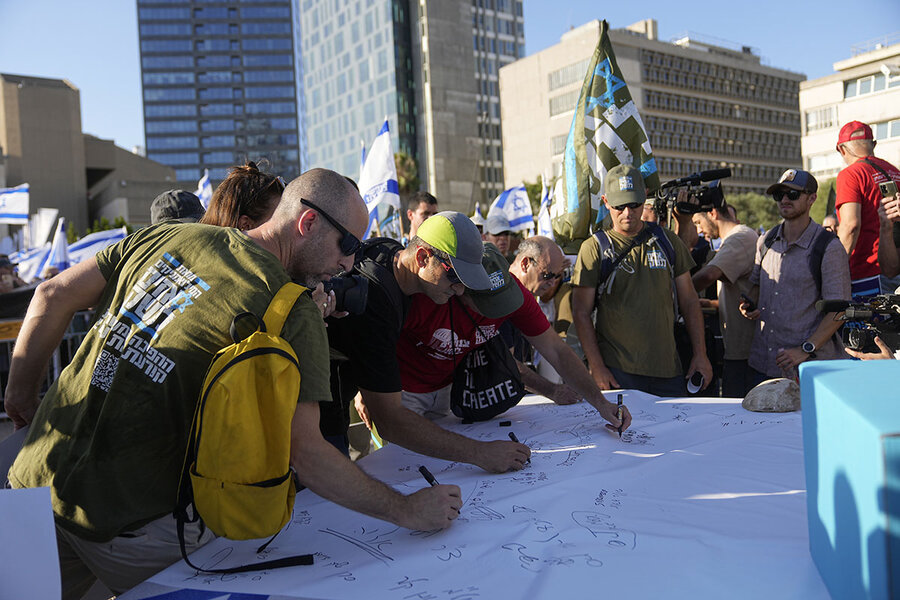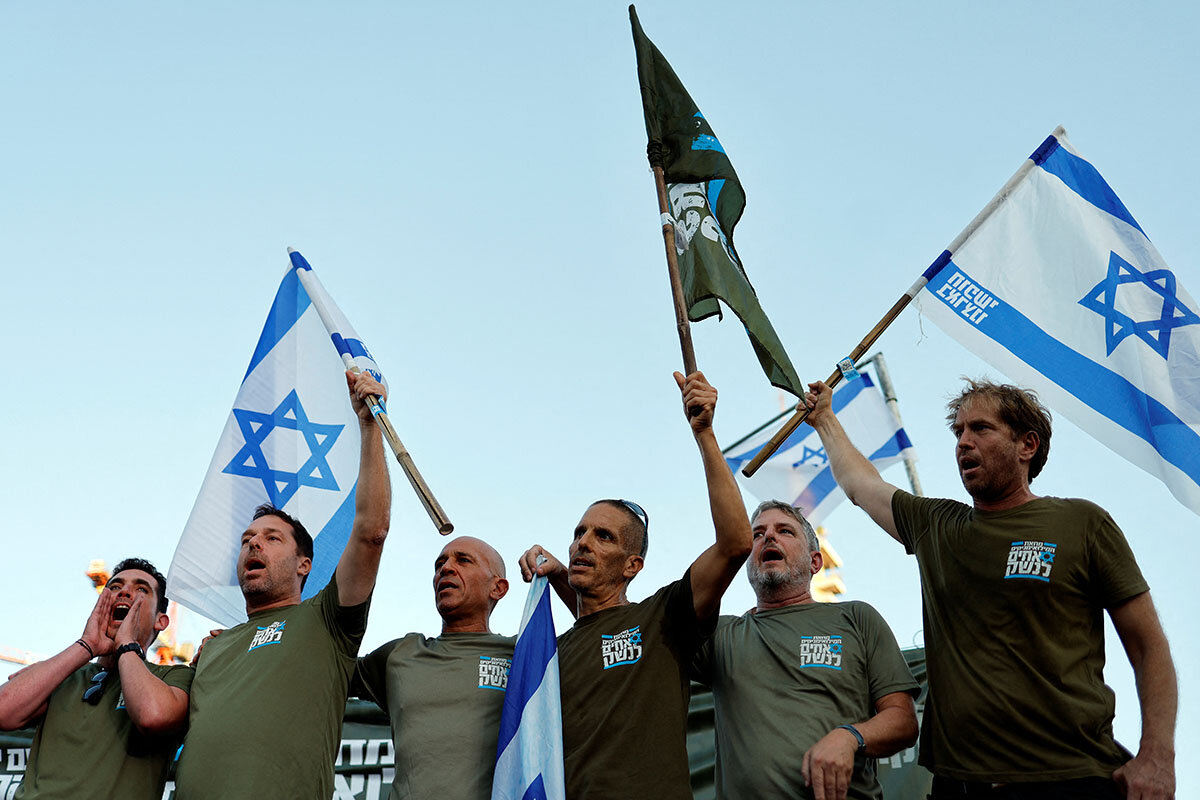In Israel’s democracy battle, a pivotal role for military pilots
| TEL AVIV, Israel
Yoram Bouskila is an air force man.
A combat helicopter pilot, he started his training at age 18. Today, nearing 60, Mr. Bouskila has served in the Israeli air force for practically all his adult life, as a fighter, an instructor, and a volunteer reservist at headquarters.
A few years ago, the father of four, a classically trained musician who invests in clean tech, did a two-year stint at the helm of the Friends of the IDF (Israel Defense Forces) chapter of New England, a role he took on while his wife was at Harvard getting her MBA.
Why We Wrote This
A story focused onIn democracy, the ideal is that the military stays out of politics, and vice versa. But with many Israelis seeing their democracy as wobbling, it’s a refined sense of duty that is compelling veteran pilots and other military reservists to act.
He is, he says, “an Israeli citizen, a Zionist, and a Jew,” with an identity tied up, thoroughly, with the air force. He is a lieutenant colonel. A proud one.
And this week he called it quits.
He did so after watching Israel’s hard-right government push through a law Monday limiting the power of the Supreme Court to review government actions, a move denounced by critics as undermining Israeli democracy.
“It makes me cry,” he admits. “I love the air force and was planning to be involved for years to come. But we are on the edge of the abyss, and it’s my duty to do everything in my power to prevent us from falling in.
“I have served this country for nearly 42 years – following orders from different governments and taking part in every war and operation I was sent into. My decision is not about politics. It’s about the rules of the game. They have been changed on us, and I am not prepared to serve a dictatorial, illegitimate regime.”
Reservists at the front
Mr. Bouskila is not alone.
In recent months, more than 10,000 reservists from dozens of units, among them more than 1,100 from the air force, have publicly and repeatedly threatened to end their volunteer military service if the government pushed through its plan to overhaul the judiciary.
The military – which Israelis like to think of as a body above politics – has clearly been drawn into the roiling conflict. It also seems clear to many that if an institution exists that has leverage over what happens next, it would be the military.
“We pledged to serve the kingdom and not the king,” Eyal Nave, a leader of the Brothers in Arms reservist protest movement, said at a press conference last week ahead of the Monday vote in parliament.
In the lead-up to the vote, everyone from former heads of the Mossad and Shin Bet security services to the current military chief of staff, Lt. Gen. Herzi Halevi, warned that the internal military situation could get out of hand.
The areas about which they expressed concern ranged from cohesion among the ranks, to the IDF’s general preparedness, to lowering morale among active-duty soldiers and disincentivizing youngsters from volunteering for top units.
Ten former air force chiefs released an open letter calling on Prime Minister Benjamin Netanyahu to work out a solution to the crisis. “We are fearful over ... the serious and tangible danger posed to the national security of the State of Israel,” the letter said.
Then on Monday, the law passed – leaving everyone holding their breath to see if these military threats were just bluster and pressure tactics – or if the reservists would follow through.
So far, according to two pilots involved, who spoke on condition of anonymity, only a “trickle” of reservists have taken the formal step needed and informed their commanders they would not be showing up for training. But, say the pilots, something has indeed been “broken,” and more resignations are sure to follow in the days and weeks to come.
“There will always be platitudes about keeping the military out of politics. But the reality is that the military leadership ... are massively opposed to the authoritarian inclinations of this government,” says Dan Perry, former Mideast chief for The Associated Press and today a regional affairs analyst. “Realistically they are also opposed to the broader strategic positions this government represents, first and foremost the occupation and colonization of the West Bank.
“If the pilots and other reservists who threatened to quit make good on their threat, the cost to Israel’s security – to its military readiness – will be dire,” he says. “That this ‘own goal’ is happening can only be a wonderful surprise and an extraordinary gift to the enemies of Israel – an utterly self-inflicted disaster.”
A reliance on volunteers
In Israel, military service is mandatory for most people, as is, in many cases, reserve duty up to a certain age, depending on one’s rank, role, and unit. After these years of duty, however, many Israelis – in some units over 50% by some accounts – continue to serve the country in a volunteer capacity.
Pilots, who train for three years and serve a mandatory tenure of 10 more in their squadrons, often remain in voluntary service for years after, training a day every week to maintain their operational readiness and taking part in missions.
It is accepted wisdom that the military is heavily reliant on these experienced volunteers – and that reserve pilots and navigators are regularly called upon for missions.
“The [pilots’] threat is a double-edged sword,” says Mr. Perry. “On the one hand, it shows how high the cost of authoritarianism will be in Israel. On the other, though, it made the coalition even more determined to not be seen as giving in to blackmail by security people, which can be presented as a sort of ‘coup.’ It might have backfired in a way.”
Backfired for now, he clarifies – but nonetheless potentially effective going forward.
“One possible outcome,” says Mr. Perry, “is that the coalition pockets what will be sold to its base as a huge victory and then doesn’t risk such a recklessly high cost” by pursuing further pieces of its judicial overhaul.
Among those pieces are changes to the selection process for Supreme Court justices and giving parliament the power to override the court with a simple majority vote. Opponents see the judicial overhaul as opening the way for Mr. Netanyahu’s far-right and ultrareligious allies to impose their worldview on the rest of society.
Pilots under fire
Mr. Netanyahu has called on the reservists to keep out of politics but also has been dismissive of their threats – saying he’s willing to shut down “a few squadrons” in order to continue with the overhaul legislation.
Others in his party have gone far further, calling the reservists everything from anarchists to traitors.
And, in a move sharply condemned by the IDF spokesperson, several coalition members, including National Security Minister Itamar Ben-Gvir, reposted on Facebook a fictitious propaganda video in which pilots withhold combat support from ground troops who refuse to condemn the overhaul. The pilots fly away, leaving those below to be killed by enemy combatants.
“My brothers, on the left and the right,” whispers a dying soldier who called for air support. “Don’t bring politics into the army.”
Finance Minister Bezalel Smotrich wrote on Facebook, “A country that gives in to the threats of generals will actually become a country ruled by a military junta, and that is the furthest thing from a democracy.”
Fueling the furor over such remarks, Mr. Ben-Gvir never served in the military, and Mr. Smotrich only did short service in a noncombat role.
Maj. Gen. Tomer Bar, the air force commander, hit back, saying such statements “have no place in society and ... cause great damage to the cohesion of the force.”
The establishment line
This is not the first time Israeli pilots have sought to influence policy – but the scale is unprecedented.
In September 2003, a group of 27 pilots sent a letter to Dan Halutz, the air force commander then, in which they refused to fly operations endangering Palestinian civilians, such as missions targeting militants in the West Bank and Gaza even as they moved near crowds.
Back then, the establishment, all as one, turned on what was dismissed as a “marginal, small group.” The chief of staff decried their “illegitimate” statements.
Even more telling, hundreds of other pilots then signed a counterpetition denouncing those who had refused to serve – causing a few of the original group to backtrack. Protest leaders and others were suspended by Major General Halutz.
Today, those threatening to stop serving the country are not only many more in number but include the establishment. One of the leaders of the current protest movement is none other than Mr. Halutz himself.
“The government is declaring war against the character and values of the State of Israel, and we won’t let this happen,” he said. “We won’t let the darkness descend upon us.”










